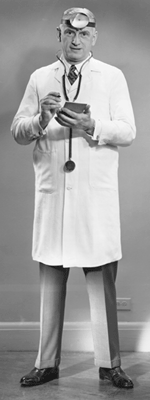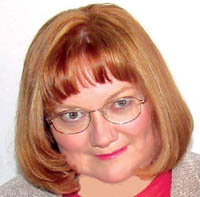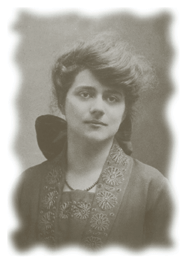How to Fix the Health Care System
By Mary Pride
Printed in Practical Homeschooling #21, 1998.
 The healthcare industry is in traction and the prognosis is not good. Can we help?
The healthcare industry is in traction and the prognosis is not good. Can we help?

|
 |
My grandmother always warned me not to trust doctors.
And this was odd, because my grandmother was a doctor.
Born in 1901, Magda Radnai ("Kitchi" to her friends) was one of the first woman graduates of the medical school at the University of Budapest, in Hungary. That is where she met my grandfather, Julius Levatich, also a medical student. Upon marriage, my tall blond grandfather and short brunette grandmother both practiced medicine for many years, until, with my mother and my uncle, they fled Hungary during World War II just as the Russians invaded it.
So my grandmother's wariness of doctors was not based on ignorance. Rather, it was based on her own understanding of the history and attitudes of conventional medicine.

|
|
Wasn't my grandmother beautiful? She helped me see that doctors are just people, and that they can make mistakes.
|
While other kids were watching "Howdy Doody," I was sitting in Namama's living room ("Namama" was my childish mispronunciation of nagymama, the Hungarian word for grandmother) listening to her tell stories. Like the story of Ignaz Semmelweis. His short life, which began in 1818 and ended tragically in 1865, was to her a potent symbol of everything that is wrong with the current medical mindset.
The Semmelweis Syndrome
Semmelweis, you see, was the first to discover that when doctors washed their hands before delivering babies, the mothers didn't die of "childbirth fever." At the time, 12 out of every 100 Hungarian women who gave birth died of this disease, which we now realize was caused by the doctors' own unhygienic practices. A doctor would go straight from an autopsy, where he was cutting up a corpse riddled with disease, to the bedside of a woman in labor. With the same hands that had recently been covered with putrid bodily fluids, he would probe around or inside the woman's body in the course of delivering her baby. Naturally, the incidence of infection was high. There were maternity hospitals in Budapest, my grandmother tells me, where the mortality rate from childbirth fever approached 100 percent - which is why women had their babies at home, if they possibly could.
Semmelweis discovered a simple procedure which put an end to childbirth fever in his patients. So what was the reaction of the medical community? Ridicule. Persecution. The attacks against Semmelweis were so severe that, overcome with depression, he took his own life.
Lister and the Discovery of Antiseptic Medicine
Meanwhile, a man you probably have heard of, Joseph Lister (in whose honor "Listerine" is named), was developing his own theory of "anti-sepsis." The very year Semmelweis died, Lister began performing the first germ-free operations. At the time even the smallest surgical procedure carried a 50 percent risk of death - not due to the surgery itself, but to the seemingly inevitable infections that would follow (again, transmitted by unsterile instruments and unwashed doctors).
The results of Lister's innovations were stunning. Patients who were expected to die, didn't. And again, persecution was his immediate reward. You'd never know this from reading the World Book Encyclopedia entry, which only mentions Lister's contributions and his eventual honors, received decades after his initial discoveries. But Lister's discovery, and his theories that germs caused wounds to get infected, earned him immediate, scathing, constant denouncements from the day's top medical authorities. If you read a biography of Lister, you'll probably be awed, as I was, by his remarkable perseverance and self-sacrifice as he continued striving, year after year, in the face of incredible discouragements.
Eventually Lister did prove to everybody's satisfaction that he and Semmelweis were right - but only after tens of thousands had died needlessly as a direct result of their doctors' refusal to examine the evidence for themselves.

|
|
He used to be paid in eggs and turnips. Today he vacations on the Caribbean and hires investment counselors to help him handle the surplus. Assuming the lawyers don't chew him up first. Isn't it time we changed these rules?
|
"Why," my grandmother would ask me, "did those doctors not listen to poor Semmelweis?" Answering her own question, she would continue: "Because they didn't want to admit they had been responsible, even unwittingly, for harming their patients." One doctor did believe Semmelweis. He had delivered his daughter' baby with unwashed hands, and she had died of childbirth fever. Stricken with remorse, he killed himself. Meanwhile, his thicker-skinned colleagues merely continued killing their patients.
Doctors Can Be Wrong
"It is important for you to understand this, Mary," Namama would say. "Doctors are not always right. In fact, they have often been wrong. But they are trained to be certain that they are always right. This makes it very hard for them to change their minds about anything."
During her long life (she lived to be 90 years old), Namama never failed to notice and point out how medical fads come and go. She especially loved to point out how the very foods that one decade were said to be "practically poison" were hailed as healthy a few years later, and vice versa. "I am just waiting for the article that says sugar is good for you, so I can start eating it again," she used to joke. Not that Namama was any kind of health faddist. In fact, she saw a doctor regularly for the heart condition she developed in her fifties, and took the medicine he prescribed.
Aside from Namama's stories, my childhood exposure to the world of doctors and medicine was small. I had checkups, but didn't see the inside of a hospital until I was 12 years old. My mother nursed me through the usual childhood diseases at home. Chicken pox, measles, earaches, swollen glands,and flu all were handled without any fuss. Getting sick wasn't the least bit scary. It just meant missing school (yay!) and having my dad bring me toys and Charlie Brown books. In fact, when I thought about it I began to realize I would rather be sick (e.g., home from school) than not, and so I began faking it whenever possible. (Naturally, now that I am a born-again Christian I do not recommend deceiving your parents in order to stay home from school. Instead, I recommend skipping school altogether and homeschooling!)
At age 12, I caught the mumps. This was my first chance to experience hospital life. My reactions were as follows:
- I want to go home.
- Hey, they have a TV set here! (We had no TV at home.)
- I can watch it all day and night!
- I think I'll watch a scary movie! (Even if we had owned a TV, I definitely would not have been allowed to watch scary movies.)
- Oooh, now that I'm watching this scary movie all alone in the ward at 2 a.m. I really want to go home!
That hospital is also where I had my first brush with surrealism (school being the other surreal environment in my life). Wake me up to give me a sleeping pill? Make me stay in bed all day when all I have is swollen glands? And what is this? Is this supposed to be food? I thought they wanted me to get better in here!
I Start to Question
I managed to steer clear of doctors and hospitals for a long time after that - until I became pregnant with my first child, in fact. At that point I had a first encounter of the worst kind, with the "best ob-gyn in town."
At the first appointment (for which he charged us $100), he announced I had a "small pelvis" and would have to have any baby over 7 pounds by c-section. (I have since delivered many babies over 10 pounds with no problems, including one who was 12 pounds 13 ounces!) At the second appointment (another $100), he told us the third appointment would be for genetic counseling.
Hmm.
I called his office after getting home and asked if he did abortions. After a lot of hemming and hawing, the nurse admitted this was indeed the case.
During our search for a doctor who did not perform abortions, we first encountered the idea of "midwives." We couldn't find one, so I had our first baby, Ted, in the hospital. When I became pregnant with our second child, good friends, noting all of Ted's severe medical problems, pressed a book into my hands called What Every Woman Should Know: the Truth About Diet and Drugs During Pregnancy, by a Dr. Brewer and his wife, an R.N.
Reading that book, I quickly discovered that Ted's many medical problems likely had their roots in my very poor nutrition while pregnant with him. I had eaten the wrong things, and seeking to keep my weight down (as the doctor insisted I do), I hadn't eaten enough in general. Acting on this theory, I ignored yet more doctors when they advised me never to have another baby, because for sure (they said) the next child would have far worse problems than Ted. I simply ate better, following the Brewers' directions, and had eight healthy children in a row.
This was when I really began thinking about how medicine is practiced in this country.
Reading that book, and other books that followed, made me aware that standard medical practices (e.g., forcing laboring women to deliver in "stirrups") often have no research-based justification. In fact, available medical research often proves that common procedures are wrong-headed and dangerous. As I continued to read about unnecessary c-sections (like my first doctor had tried to set me up for), the contradictory to nonexistent nutritional counseling women often get during pregnancy (my second doctor had never investigated my diet, just asked if I was eating "well"), and how practices such as "stress tests" and fetal monitoring can actually lead to the very disasters they are supposed to prevent, I began to ask myself:

|
|
We won't have to dress like this. But to revive healthcare as a ministry of the church, we will need single people as dedicated as this nun. Could this be your vocation?
|
"What is going on here?
Is this just Semmelweis and Lister all over again?"
The Forgotten History of Medical Care
My interest in things medical continued unabated for years. Eventually it resulted in me coauthoring a book (now out of print) with Paul deParrie, called Unholy Sacrifices of the New Age. As we researched the history of medical care, in both pagan and Christian civilizations and throughout the history of the Western world, we found several fascinating facts, and came to some surprising conclusions.
Did you know that Christians invented hospitals? And that basic medical and nursing care was for centuries a ministry of the church, offered for free?
Did you know that the cost to the consumer of a hospital stay is now higher, after insurance has paid its part, than it was back when almost nobody had medical insurance?
Did you know that in every case where government has taken over a country's health care, costs are held down by reducing or eliminating services? And that plans are already in place to refuse treatment to the congenitally handicapped and elderly when and if we get national health care?
What Is the Solution?
Medical care should be the ministry of the church, offered for free. This sounds radical, but give me a minute and answer this question:
What did Jesus spend his time on earth doing?
I'll give you the answer. Apart from His prayers and His sacrificial death, His work consisted of teaching and healing. Two things. He taught. He healed.
The Bible teaches that Christians today are the Body of Christ. Among other things, this leads to the understanding that we are supposed to follow his example. We should do the work He did. And what was that work again?
Teaching.
And healing.
The early church understood this to include taking care of the sick (which does not just mean praying for them). And that does not mean just the Catholic church. In the mid-1800s, new orders of Protestant nursing sisters were still being established in America and other Protestant countries, inspired by Pastor Theodor Fliedner of Kaiserwerth in Germany. Florence Nightingale, who you have probably heard called the founder of modern nursing, was strongly influenced by Pastor Fliedner. And of course, even today the Catholics have the Little Sisters of Charity (Mother Teresa's group) and other nursing orders of both monks and nuns.
Why such orders, of both men and women? Because free medical care can only be free if some people voluntarily sacrifice their financial and marital ambitions to provide it for others. While as a Protestant I don't believe lifetime vows of celibacy are necessary or helpful, it certainly would make sense for the church to require a term of service in exchange for a free medical education. Read the Brother Cadfael stories (Greenleaf Press has them) to see how church-sponsored ministries of hospitality and healing were run in the past, and what a vast difference they made to the lives of their communities.
You see, I don't think Jesus was kidding when he said, "He who would be greatest among you shall be servant of all." When the church fulfills her servant role, she prospers. That is how the church took over the Roman Empire: through care of the sick and the poor. The people knew who they could trust to help them.
I'm not saying all doctors are bad. Some are very good. There has always been, and will always be, a need for physicians in private practice. What I'm saying is that the system itself is out of whack. Medicine should mostly be a ministry of families (caring for their own sick members as much as possible) and churches, not a business, nor yet a government function. Under this system, unlike its alternatives, there would be no incentive to run up costs, to use bad procedures, or to neglect the ill. We would be cared for by people who truly care for us. And isn't that what we all want?